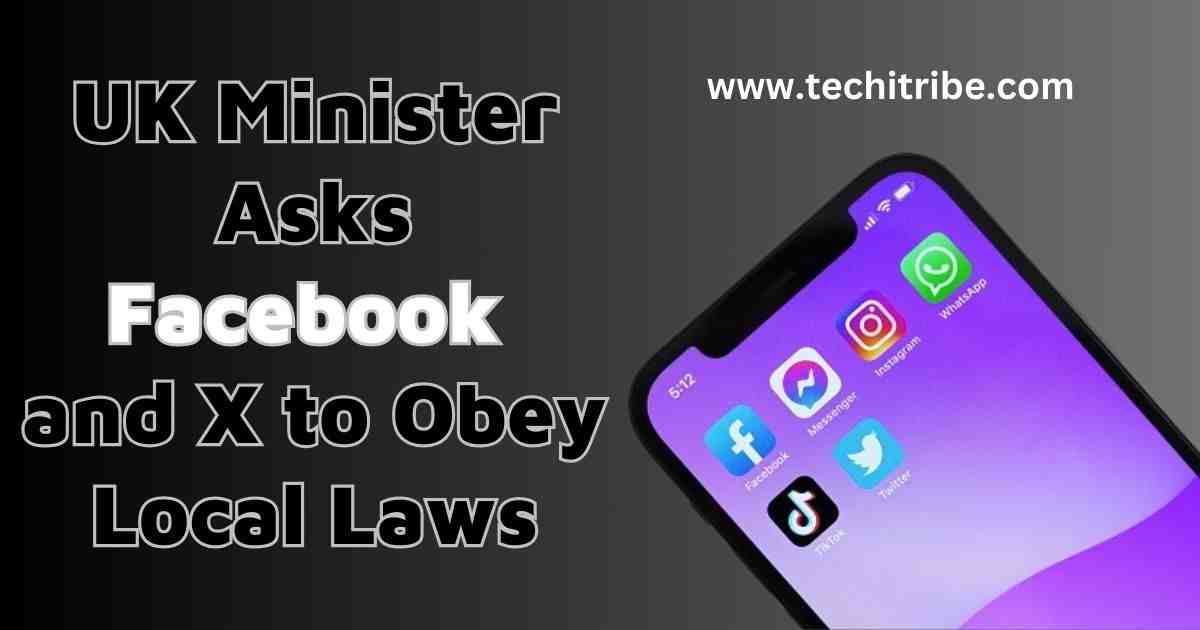UK Social Media Laws, The battle for the liability of tech giants is getting hot as a UK minister asks Facebook and X, formerly known as Twitter, to obey the local laws. When the irritation of the governments of the world about the growing influence of the social media sites and their liability is increasing.
Also visit this link: What’s Coming in iPhone SE, Free AirPods Deal, and MacBook Air

Clear Message for Social Media Moguls
Ever-greater concern of the UK
UK Social Media Laws, The UK government got alarmed lately by the attitude the social media goliaths took to issues of inappropriate content and spreading of false news. Then the corporations would have to face the system that would act both in restraint of the regional compulsions as well as in a means of driving ahead the good for the greater welfare of a bigger public.
UK Social Media Laws, More strictness would be in place for online sites in terms of part obligations demanded from them, and on top of it, such demands come from a social media couple—Facebook and X—other than minimal requirements that truly protect minors against unwanted experiences on the internet.
The provisions that exist in bills presented today are products of increasing popular demands for safety over the internet, especially against vulnerable groups such as those outlined above.
Stand of minister
The minister said some other day that no firm is above the law. Some two weeks ago, realizing the importance of innovation and free speech, he remarked that regulation can’t be bartered in the name of freedom.
He said social media giants have a responsibility both to their users and the countries in which they operate. He said we expect full cooperation to make the online environment safer. “This isn’t about restricting freedoms—it’s about making sure those freedoms aren’t used to subdue and destroy people.”.
Britain is part of the bigger trend of democratic governments wanting to put shackles on global tech giants who never allowed anyone to tie them. The minister said remarks presented at the House of Commons with tech companies face greater scrutiny for not doing enough to accommodate local rules. Online Safety Bill: Brief Overview
The Online Safety Bill embodies some of the key measures set to curb online harm. They include;
Age verification: The minor children should not get their harmful contents under effective systems. Their identities ought to be verified by some drastic measures in the restrictions concerning what categories of particular content must not reach them.
Transparency requirements: Companies ought to be in a position to give periodical reports on how things are going concerning the issue of content regulation. Responsibilities also include pillars such as transparency. The latter is, of course, reflected by those reports and showing how things stand concerning the implementation of dangerous contents in those sites.
Billions and Billions will be drawn in. Or, in case this is not so, billions and billions of pounds will be drawn in. Of course, the fines will make it a financial obligation for the tech sector companies to obey.
UK Social Media Laws, It arms Ofcom, the communications regulator of the UK, with the powers so that companies can be brought into account and the penalties will be inflicted if need be.

For Facebook and X
UK Social Media Laws, These rules will be an operational complexity nightmare for social media giants. For Facebook and X, it will mean algorithm changes, moderation capabilities improved, and much-needed transparency. It won’t be cheap; the alternative—presentation in court and paying through the nose—is much worse.
All these factors carry a heavy reputational risk. Service loss can also lead to public aversion toward them and further threaten alienating the users. In that regard, winning back user confidence could become an opportunity for both Facebook and X in getting the users safe and regulators on board.
Free Speech and Accountability
The Content Moderation Debate
UK Social Media Laws, It does get pretty heated trying to balance free speech to what would seem to be a need for regulating hateful content. Some will only say that Draconian regulations will be used to just feed censorship and keep needed discussions from taking place. However, advocates will argue that an ungoverned platform enabled hate speech, misinformation, and poisonous content.
It is seen in the distinction of lines on free speech parameters. Governments are looking for speech regulation that reaches the culmination in violent activities, disperses wrong information, or poses a threat to the interests of users. The argument that can be found from the perspective of the companies is that this is cost-effective, even resource-intensive, and very complex to monitor such a level of contents.
Role of Algorithms
UK Social Media Laws, Algorithms decide who gets to see what on the internet, yet algorithms have been accused as a vehicle of perpetuating segregationist or degrading material. Under these new regulations, Facebooks and Xs might be compelled to detail how they design their algorithms and how these algorithms evolve to meet demand so as to oblige the call for safe requirements.
This would reflect on the systems developed such that the quality of the contents instead of these metrics of levels of engagement becomes the prime concern. This way, they find themselves fine-tuning amplifiers for problematic contents and, thus, develop better online communities.
Consequences in the International Arena
Setting Precedent’s
UK Social Media Laws, It may also encourage other countries to make the same laws. Australia and Germany had such laws. The UK will force other countries to enforce strict rules on social media.
More precisely, it is observed through the example of the Digital Services Act by the EU and consequently carries out the same theme forward on the manner of execution within the UK. Therefore, this would have the result of an imposition of uniform action on such firms failing to comply with their regulator’s expectations.
Problem for Tech Firms
UK Social Media Laws, This makes it very hard for global platforms to comply in the matter in question, considering often-conflicting country-specific regulations within. However, the current consensus remains with the governments that tech giants would have to compromise on convenience over compliance.
This will be relevant to the compliance where technology firms are strong enough to sustain the compliance with the local law and even be effective to develop a customer base with no bounds. That will go along with localized solutions, however, in the global systems they still sustain uniformity amongst them.
Public Response: Amazement and disbelief
A Fragmented Outlook
UK Social Media Laws, The opposite extreme views in public have been heard concerning this step. The majority welcomes it and cannot wait for secure places to mushroom online. Both good laughter from the parents’ perspective as the free detox of toxic content meant on its way for these kids, then digital safety advocates appreciate the government efforts that standout upon these issues in today’s society.
UK Social Media Laws, But there are many who believe that such regulation would also curb certain freedom, would restrict expression of creative minds. Another question has been how would it be so done that the companies will not get choked up due to its regulation.
Another fear that has been voiced against this proposed law is that of the misuse and abuse of power by the government.
Industry Heads View
Mixed Reaction by Tech Chiefs
UK Social Media Laws, Partially, some of the business leaders in this technological industry are waking up to the realization that consumer protection should be implemented before others start dreading how overregulation will affect such policies.
It has not been that easy for innovation and compliance regarding companies

The Future of UK Social Media: The Turning Point
UK Social Media Laws, This actually does represent the call for compliance, but is a bit more of a seismic shift in the manner that the tech companies have to relate with their governments. And therefore it will come down to whether they are the Facebooks, Xs, and the likes that now have to choose to comply or be litigated.
This step also includes the element of accountability in the digital world. However, while measures instituted by the governments of this world might eventually lead to that, the end of an unregulated stranglehold also ends the unregulated power play by the tech companies.
Not at all hard, but rather revolutionary—it is the idea. The extent of responsibility that technology has on companies could evolve on an entirely new scale—and here, that can be through high-tech moderation tools.
Which standards of innovation fuel this new creation encompass: the content-moderation guidelines to become synonymous with how to innovate itself; safety parameters that can be enforced with AI; and highly transparent reporting means that make all platforms stand compliant with every expectation set by regulation.
Conclusion: The New Age of Accountability
UK Social Media Laws, This says much more about a great movement to put technology companies on their toes than that the government of the United Kingdom is bent on forcing Facebook and X to bend the knee. Those corporations will function in new regulatory spaces, and thus that will be an establishment feature of debate-innovation, free speech, and safety.
This reflects a continually rising consensus: the digital world must be governed by public interest rules so that the experience of the internet becomes safer and fairer for all. Social media can promote trust and favorable user engagement in embracing accountability so that the future of digital interaction may become better.
